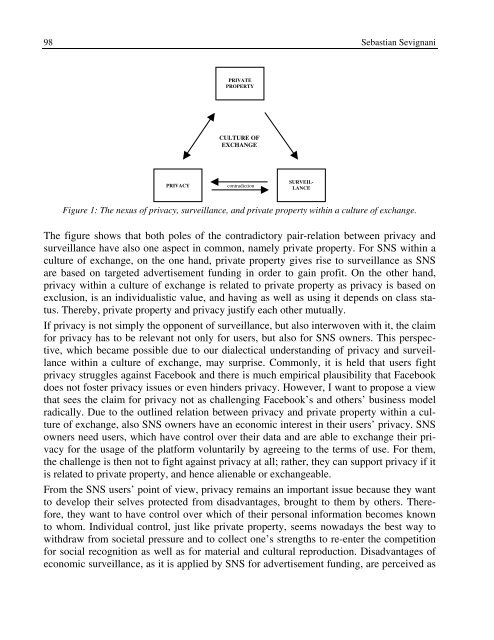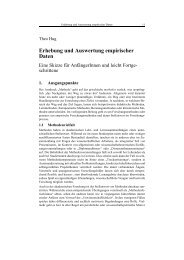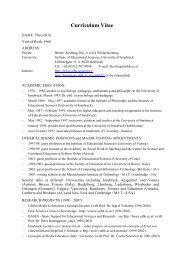Cultures and Ethics of Sharing - Universität Innsbruck
Cultures and Ethics of Sharing - Universität Innsbruck
Cultures and Ethics of Sharing - Universität Innsbruck
- Keine Tags gefunden...
Sie wollen auch ein ePaper? Erhöhen Sie die Reichweite Ihrer Titel.
YUMPU macht aus Druck-PDFs automatisch weboptimierte ePaper, die Google liebt.
98 Sebastian SevignaniPRIVATEPROPERTYCULTURE OFEXCHANGEPRIVACYcontradictionSURVEIL-LANCEFigure 1: The nexus <strong>of</strong> privacy, surveillance, <strong>and</strong> private property within a culture <strong>of</strong> exchange.The figure shows that both poles <strong>of</strong> the contradictory pair-relation between privacy <strong>and</strong>surveillance have also one aspect in common, namely private property. For SNS within aculture <strong>of</strong> exchange, on the one h<strong>and</strong>, private property gives rise to surveillance as SNSare based on targeted advertisement funding in order to gain pr<strong>of</strong>it. On the other h<strong>and</strong>,privacy within a culture <strong>of</strong> exchange is related to private property as privacy is based onexclusion, is an individualistic value, <strong>and</strong> having as well as using it depends on class status.Thereby, private property <strong>and</strong> privacy justify each other mutually.If privacy is not simply the opponent <strong>of</strong> surveillance, but also interwoven with it, the claimfor privacy has to be relevant not only for users, but also for SNS owners. This perspective,which became possible due to our dialectical underst<strong>and</strong>ing <strong>of</strong> privacy <strong>and</strong> surveillancewithin a culture <strong>of</strong> exchange, may surprise. Commonly, it is held that users fightprivacy struggles against Facebook <strong>and</strong> there is much empirical plausibility that Facebookdoes not foster privacy issues or even hinders privacy. However, I want to propose a viewthat sees the claim for privacy not as challenging Facebook’s <strong>and</strong> others’ business modelradically. Due to the outlined relation between privacy <strong>and</strong> private property within a culture<strong>of</strong> exchange, also SNS owners have an economic interest in their users’ privacy. SNSowners need users, which have control over their data <strong>and</strong> are able to exchange their privacyfor the usage <strong>of</strong> the platform voluntarily by agreeing to the terms <strong>of</strong> use. For them,the challenge is then not to fight against privacy at all; rather, they can support privacy if itis related to private property, <strong>and</strong> hence alienable or exchangeable.From the SNS users’ point <strong>of</strong> view, privacy remains an important issue because they wantto develop their selves protected from disadvantages, brought to them by others. Therefore,they want to have control over which <strong>of</strong> their personal information becomes knownto whom. Individual control, just like private property, seems nowadays the best way towithdraw from societal pressure <strong>and</strong> to collect one’s strengths to re-enter the competitionfor social recognition as well as for material <strong>and</strong> cultural reproduction. Disadvantages <strong>of</strong>economic surveillance, as it is applied by SNS for advertisement funding, are perceived as








